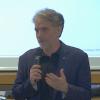Research interest in social networks area can be explained mainly because this type of network: (i) promotes the interpersonal relationship; (ii) has a natural tendency for knowledge emergence; (iii) generates large volumes of information. This interest is reinforced due to the fact that since the 90's Web Social Networks, e.g. Facebook or Orkut, have millions of users around the world. Our proposal in this paper is to analyze the physical structure of three computer networks topologies - centralized, decentralized and distributed - in a real academic social network, the Lattes Curriculum. The main question is how the network structure could influence the flow of the trust transitivity between the members of the network. Firstly, we conducted a survey with researchers about their trust in Lattes Curriculum and later we developed an agent-based model and simulated it to analyze the resulting data.
Structural transitivity of trust in academic social networks using agent-based simulation
Tipo Pubblicazione:
Contributo in atti di convegno
Publisher:
M. Jeusfeld c/o Redaktion Sun SITE, Informatik V, RWTH Aachen., Aachen, Germania
Source:
EUMAS 2013, pp. 97–111, Tolosa (Fr), December 2013
Date:
2013
Resource Identifier:
http://www.cnr.it/prodotto/i/308200
http://www.scopus.com/inward/record.url?eid=2-s2.0-84908339578&partnerID=q2rCbXpz
Language:
Eng


